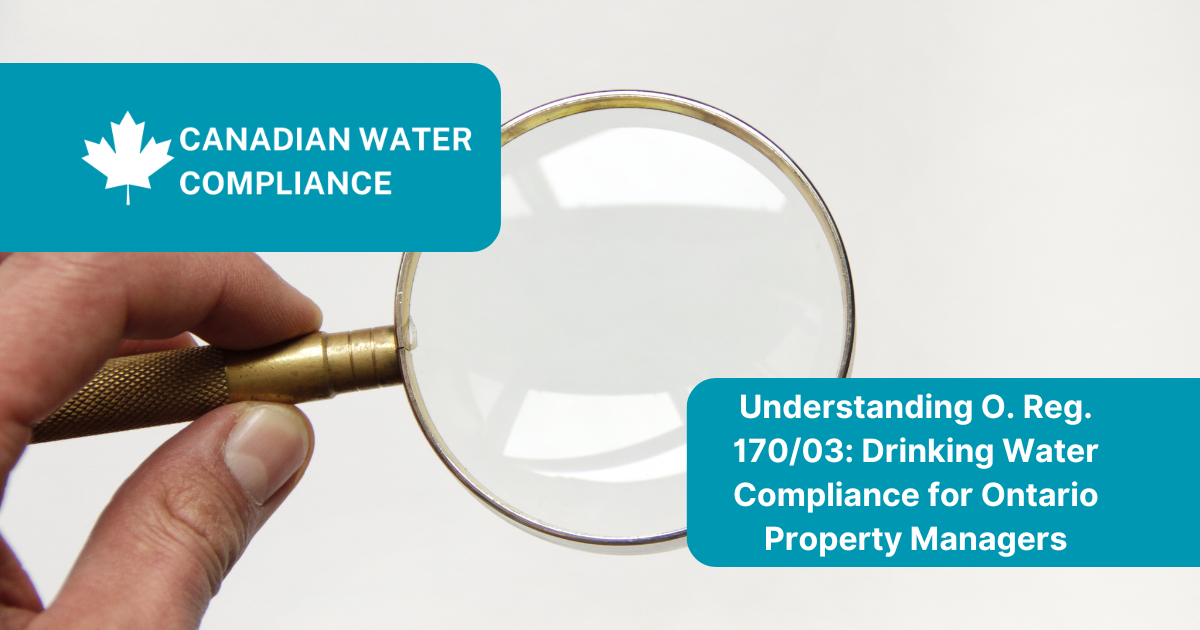
Written By: Canadian Water Compliance | On
Safe, compliant drinking water is not only a matter of public health—it’s a legal obligation for many property managers and building owners across Ontario. Whether you oversee a small private school, a condominium, or a commercial plaza, understanding Ontario Regulation 170/03 (Drinking Water Systems) is essential.
In this article, we break down the key aspects of O. Reg. 170/03, explain which types of facilities are subject to it, and provide actionable best practices to stay compliant and avoid costly penalties.
Ontario Regulation 170/03 falls under the Safe Drinking Water Act, 2002 and sets out responsibilities for owners and operators of drinking water systems in Ontario. Its primary objective is to ensure the delivery of safe, potable water to users and to establish strict sampling, testing, and reporting requirements for various types of facilities.
While many large municipal systems are covered under this regulation, many non-municipal systems are as well—including those that serve:
Mobile home parks
Campgrounds
Resorts and lodges
Churches
Daycares and schools (especially those not connected to a municipal system)
Industrial and commercial buildings with their own private water source
If your property supplies water to the public and you are not connected to a municipal system, there's a good chance you're regulated.
The specific obligations vary depending on the classification of your drinking water system. Here are the most common types of systems and what they generally require:
Common in rural businesses, churches, or seasonal establishments.
Must test for E. coli and total coliforms regularly.
Frequency: At least every three months (or more frequently based on risk).
Typically found in mobile home parks or trailer parks.
Must test for E. coli, total coliforms, and nitrates/nitrites.
Must implement an Operational Plan and have a Licensed Operator.
Annual reporting and adverse water event protocols required.
Must submit a notice of seasonal startup.
Test for microbial parameters prior to and during the season.
Failure to meet regulatory requirements can result in:
Boil Water Advisories (BWAs) issued by your local Public Health Unit
Fines and legal action under the Safe Drinking Water Act
Damage to your organization’s reputation
Potential liability for health consequences if contamination leads to illness
In 2022, several facilities across Ontario were issued BWAs due to lapses in regular testing or failure to maintain treatment systems.
Determine the type of system your facility falls under. Canadian Water Compliance can help you assess your classification and responsibilities.
Make water testing part of your routine building maintenance. Partner with a certified water testing company that can help manage reminders and compliance deadlines.
Keep logs of all sampling, lab reports, and maintenance activities. This is critical if you are ever audited or inspected.
Operators of certain systems must hold MOECC certifications. Ensure your water system is managed by a qualified team.
Regulations can change. Partner with a compliance-focused company to ensure you always meet current standards.
At Canadian Water Compliance, we specialize in helping property managers across Ontario stay compliant with all applicable water regulations, including O. Reg. 170/03. Our services include:
Classification assessments
Routine sampling and certified lab analysis
Operational plans and reporting support
Emergency testing and outbreak response
Don’t risk a compliance issue. Let us help you simplify your responsibilities and protect your tenants, staff, and business.
Need help understanding your water system's regulatory obligations?
Contact Canadian Water Compliance today for expert assistance and reliable water testing services across Ontario.